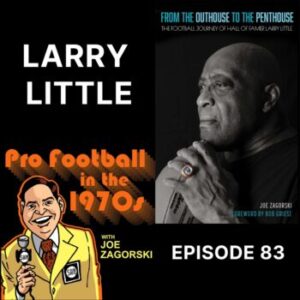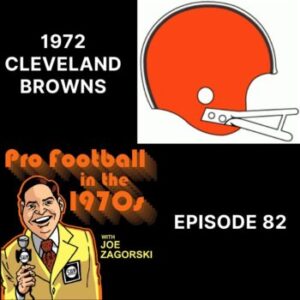At this time of the year, the NFL playoffs are on the minds of many thousands of pro football fans across the nation. The same goes for the teams that are preparing for the playoffs. In the 1970s, there were fewer playoff teams than there were today. One of the reasons for this is that there were fewer overall teams in the NFL back then.
Today, we have a total of 32 NFL teams. Back in the 1970s, the total number of teams was 26 and then beginning in 1976, the league had 28 total teams, with the addition of Seattle and Tampa Bay in our nation’s Bicentennial year. Back in the 1970s, the NFL had a total of eight playoff teams until 1978, when the total number of playoff teams increased to 10, with five playoff teams representing each conference.
And just like today, the playoffs during the 1970s brought out the best and most spirited play in those teams that were vying for a chance to move on towards a championship. But on occasion, it could also bring out the worst in a team.
Let’s face it…some teams choke during the playoffs. Some teams play exceedingly well during the regular season, only to lay a collective egg in the postseason. In this episode, we’re going to tackle a couple of playoff games where a couple of those teams made some untimely mistakes, which spelled defeat for their teams.
1972 Cleveland Browns
Let’s start with the 1972 Cleveland Browns. They put together a great 10-4 season after dropping their home opener to Green Bay. Third-year quarterback Mike Phipps came into his own that year, throwing for 1,994 yards and 13 touchdowns. Keep in mind that 1972 was deemed “The Year of the Runner,” and it truly was.
A total of 10 different running backs across the league ran for at least 1,000 yards that season. The Browns had a future Hall of Fame halfback in Leroy Kelly, and he was greatly depended on by Cleveland head coach Nick Skorich to carry the Cleveland offense.
Unfortunately for the 1972 Browns, they were the AFC’s Wild Card team in 1972, and as such, they were slated to go down to Miami to play the undefeated Dolphins in the first round of the playoffs. On paper, that game appeared to be a mismatch. But the Browns played what could have been described as their best game of the year.
They held Miami to 20 points, and the Dolphins needed to score a late touchdown near the end of the fourth quarter to pull out a 20-14 win. But were it not for several egregious mistakes by Cleveland’s offense and their special teams, we would still be looking for a team to complete a perfect season. Mike Phipps was guilty of throwing five costly interceptions in that game. Take away say two of them, and we are probably talking about a Cleveland upset win.
Combine that with the blocked punt that the Browns gave up in the first quarter, which was returned for a touchdown by Miami special teams player Charlie Babb, and we are definitely talking a Cleveland victory.
1978 Houston Oilers
Then there are the 1978 Houston Oilers. Behind their future Hall of Fame rookie tailback Earl Campbell, the Oilers put together an impressive 10-6 record, good enough for one of the two AFC Wild Card spots. They somehow managed to win two playoff games as the visiting team, first over Miami, then over the New England Patriots.
They were not favored in either, yet there they were, just one step away from the Super Bowl. But that one step was a big one. The Oilers were slated to go up to Pittsburgh to play the Steelers, a team with plenty of playoff experience. The 1978 AFC Title Game could not have turned out worse for the Oilers.
The freezing rain at Pittsburgh’s Three Rivers Stadium was relentless, and the below-freezing temperatures sure did not help a team like Houston, who played half of their games in a dome stadium. The Oilers committed nine turnovers, including five interceptions by quarterback Dan Pastorini. It was so bad for Houston, that in the span of 48 seconds in the second quarter, the Steelers would score 17 points en route to a 31-3 halftime lead. Pittsburgh would coast to a 34-5 win.
My point with this episode is that playoff pressure can really do major damage to some teams. Some really good teams that had great regular seasons. And that playoff pressure can do damage to older, more experienced teams, as well as the younger playoff teams. It was true during the 1970s, and it is still true today.
Host and Author of Pro Football in the 1970s - Joe Zagorski
Throughout his days, Joe spent some time as a sportswriter and has been a member of the Pro Football Researchers Association since the mid-1980s. Joe is also a proud member of the Pro Football Writers of America.
Also, if you’re interested in picking one of Joe’s books up, all three are listed below.
Here, you can learn more about Joe and Pro Football in the 1970s.
Please Note – As an Amazon Associate I earn from qualifying purchases
Music from https://www.purple-planet.com/
More Posts From Pro Football In The 1970s
Which Team “Could” Have Beaten the 1972 Dolphins?
The 1972 Miami Dolphins established a standard that has not...
Read MoreRemembering the 1973 Denver Broncos
The 1973 Denver Broncos were indeed a special team. They...
Read MoreExploring the Career of Hall of Fame Offensive Guard Larry Little
As many of you may know, I recently wrote a...
Read MoreRemembering the 1972 Cleveland Browns
How many NFL teams during the 1970s do you remember...
Read More



